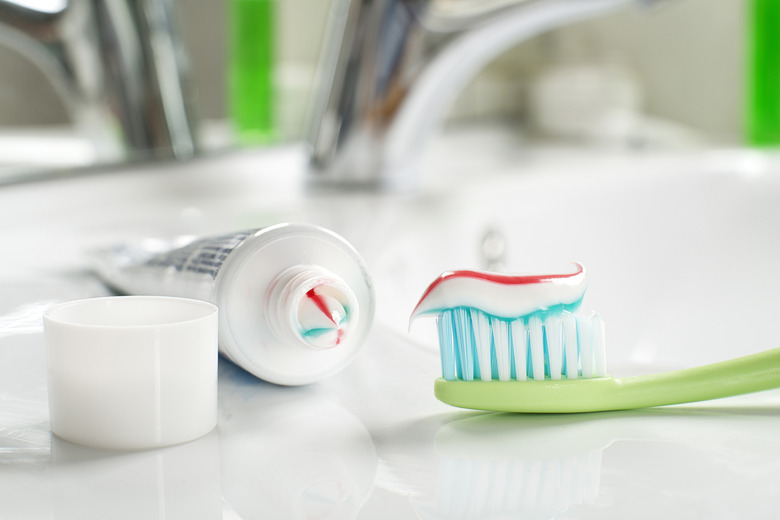How Do Acids & Bases Affect Our Daily Lives?
Acids and bases definitely serve important functions both inside and outside the scientific laboratory. In every day life, acids and bases play a role in everything from digestion of the foods you eat to the function of the medicine you take and even the cleaning products you use. Without acids and bases, many of the products in your home today would not have much use.
TL;DR (Too Long; Didn't Read)
Acids (low pH) and bases (high pH) are easy to find outside the chemistry lab. Toothpaste and antacids are good examples of basic products while food items like orange juice or oranges are highly acidic.
The pH Scale
The pH Scale
The pH scale runs from 1 to 14 and displays the range of acids and bases from top to bottom. Any substance measuring 1 to 6 on the pH scale (low pH) is an acid while any substance measuring 8 to 14 on the pH scale (high pH) is a base. A substance with a pH of 7 is neutral. A good example of a neutral substance is pure water.
The term pH stands for "potential for hydrogen ion concentration" and refers to the amount of hydrogen ions in a solution. The greater the number of hydrogen ions, the lower the pH. The fewer the number of hydrogen ions present, the higher the pH.
Toothpaste and pH
Toothpaste and pH
If you brush your teeth every morning when you wake up, you have already experienced your first base of the day. Toothpaste, which contains sodium fluoride, belongs to the group of weak bases. The high pH of toothpaste helps kill any bacteria that reside in your mouth at the time of brushing. Those bacteria prefer a neutral to slightly acidic environment, exactly the conditions of your unbrushed mouth.
pH of Food Products
pH of Food Products
The everyday foods you eat also have characteristic properties of acids or bases. Let's say you drink a nice tall glass of orange juice for breakfast after brushing your teeth. Orange juice and oranges themselves are quite acidic on the pH scale. A high citric acid content gives the oranges a low pH. On the other hand, if you indulge in a steak and some potatoes for lunch, that food has mostly basic properties.
Acid Neutralizing Medications
Acid Neutralizing Medications
Uh oh! All that food has come back to haunt you. In your stomach, your body produces gastric acid, an extremely acidic (pH 1-2) material that helps to break down the steak and potatoes you ate fro lunch. The acid turns on enzymes that break down the proteins in the food. This highly acidic environment also helps control potentially harmful microorganisms from entering your intestines, where they can cause serious illness.
When your stomach produces too much gastric acid, you may experience a common condition called acid reflux or heartburn. This occurs when overproduction causes the acid to creep up your esophagus. Antacids, which are high pH and therefore basic, neutralize this acid to provide relief from the burning feeling.
Cleaning Products
Cleaning Products
Some of the most common cleaning products found in your kitchen or laundry room have basic or acidic properties that enhance their cleaning power. For example, when drains become clogged, the basic properties of some chemicals allow the product to "eat through" the clog and clear the drain.
Whether you browse your kitchen, your bathroom or your laundry room, you will find great examples of acids and bases all around you. The pH scale is an important concept both inside and outside the chemistry lab.
Cite This Article
MLA
Mac, Ryan. "How Do Acids & Bases Affect Our Daily Lives?" sciencing.com, https://www.sciencing.com/do-bases-affect-daily-lives-6460548/. 11 May 2018.
APA
Mac, Ryan. (2018, May 11). How Do Acids & Bases Affect Our Daily Lives?. sciencing.com. Retrieved from https://www.sciencing.com/do-bases-affect-daily-lives-6460548/
Chicago
Mac, Ryan. How Do Acids & Bases Affect Our Daily Lives? last modified August 30, 2022. https://www.sciencing.com/do-bases-affect-daily-lives-6460548/
